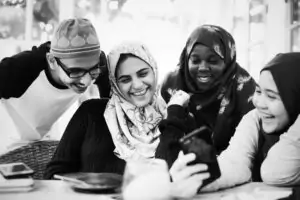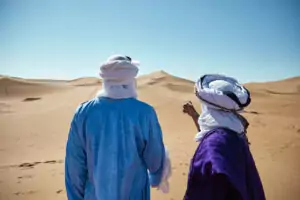Arabic, a language known for its rich cultural heritage, offers a plethora of ways to express love and affection. Whether you want to convey your feelings to a significant other, a friend, or a family member, learning how to say “I love you” in Arabic can deepen your connections and add a touch of romance to your conversations. In this guide, we will explore various ways to express love in Arabic, highlighting key phrases and their significance.

✅ AI Essay Writer ✅ AI Detector ✅ Plagchecker ✅ Paraphraser
✅ Summarizer ✅ Citation Generator
Ways to Say “I Love You” in Arabic
The Most Common Standard Expression
The phrase “uHibbuk” (أحبك) is the most common way to say “I love you” in Arabic. This expression belongs to Modern Standard Arabic (MSA) and is widely recognized across different dialects. When addressing a male, you would use “uHibbuk,” while “uHibbuki” is used when addressing a female. This phrase serves as a foundation for expressing love in Arabic and is a great starting point for language learners.
Variation in Dialects
In different Arabic dialects, slight variations of the phrase “I love you” exist. For example, in Egyptian Arabic, you would say “ana baHibbak” (ٲنَا بحِبَّك), while in Syria, the phrase “bieishqak” (بعشقك) is commonly used. These variations add cultural nuances and regional flavors to the expression of love in Arabic, making it more personal and relatable.
Deep Affection and Endearment
Arabic offers several endearing phrases that go beyond a simple “I love you.” Expressions like “enta ‘umri” (انت عمري) meaning “You are my life” and “Habiibi” (حبيبي) meaning “My love” or “darling” capture the depth of affection and romantic connection. These phrases allow you to convey the profound impact someone has on your life and express your feelings in a more heartfelt manner.
Romantic Arabic Phrases
Terms of Endearment
Arabic provides a range of endearing terms that are commonly used to express love and affection. “Habiibi” (حبيبي) is a widely recognized term for “my love” and can be used for males. Similarly, “Habiibti” (حبيبتي) is used for females. These terms evoke a sense of warmth and familiarity in relationships. Other phrases like “Ya ‘amar” (يا قمر), meaning “my moon,” “Ya rouHi” (يا روحي), meaning “oh, my soul,” and “Ya Helw” (يا حلو), meaning “you’re sweet” or “my sweetheart,” add an extra touch of endearment to your expressions of love.
Longing and Missed Connections
To express longing and the feeling of missing someone, Arabic offers the beautiful phrase “waHashtini” (وحشتني). This phrase conveys the idea of loneliness and longing for someone’s presence, expressing how much their absence is felt. It carries a deep sense of yearning and demonstrates the strength of the emotional bond between individuals.
Embracing Arabic Language and Culture
Language Learning Journey
Learning how to express love in Arabic is not only about mastering the words but also embracing the culture and traditions associated with the language. Exploring romantic expressions in Arabic opens doors to understanding the emotions, values, and connections cherished in Arab societies. It allows for a deeper appreciation of the beauty and diversity of Arabic language and culture.
Share the Love
As you embark on your Arabic language learning journey, don’t hesitate to share the love with those around you. Whether it’s expressing affection to friends, family, or even language partners, let the phrases you’ve learned spread joy and create meaningful connections. Remember, love knows no boundaries, and language can be a powerful tool to bridge cultural gaps and build stronger relationships.
Conclusion
Learning how to say “I love you” in Arabic adds a touch of romance and cultural understanding to your language skills. From the common expression “uHibbuk” to the endearing phrases like “Habiibi” and “Ya Helw,” Arabic offers a rich tapestry of words to express love and affection. By embracing these expressions and delving into the nuances of the language, you can deepen your connections, appreciate Arabic culture, and make heartfelt connections with native speakers. So, go ahead, spread the love, and let the beauty of Arabic expressions enrich your relationships.
FAQ
How do you say “I love you” in Arabic?
There are several ways to say “I love you” in Arabic, including “uhibbuk,” “enta ‘umri,” “ana bahibbak,” and more. Each phrase carries its own unique charm and is used in different dialects.
Can you say “I love you” in Arabic to friends?
Yes, in Arabic culture, expressions of love are not limited to romantic relationships. You can use these phrases with friends, family, or anyone you have a close bond with.
Are there different ways to say “I love you” in Arabic dialects?
Yes, Arabic dialects have their own variations of expressing love. For example, in Egyptian Arabic, you can say “Ana baHibbak,” while in Syrian Arabic, you can use “Bieishqak.” Explore the richness of Arabic love expressions in different regions.
What are some other romantic Arabic phrases?
Apart from saying “I love you,” you can use phrases like “Habiibi” (my love), “Ya ‘amar” (my moon), “Ya rouHi” (oh, my soul), and “Wahashtini” (I miss you) to add more romance and sweetness to your expressions.
Follow us on Reddit for more insights and updates.





Comments (0)
Welcome to A*Help comments!
We’re all about debate and discussion at A*Help.
We value the diverse opinions of users, so you may find points of view that you don’t agree with. And that’s cool. However, there are certain things we’re not OK with: attempts to manipulate our data in any way, for example, or the posting of discriminative, offensive, hateful, or disparaging material.